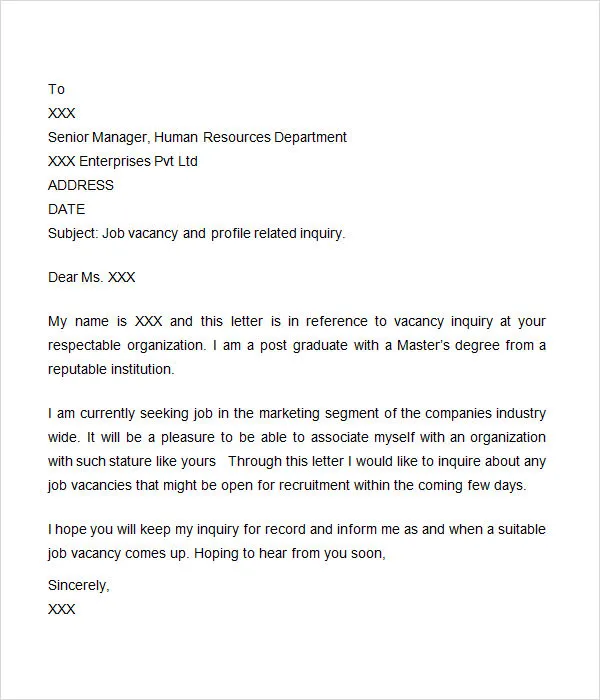Understanding Cover Letter Inquiries
In the competitive world of job searching, standing out from the crowd is crucial. One effective, yet often overlooked, strategy is the cover letter inquiry. Unlike a traditional cover letter that responds to a specific job posting, a cover letter inquiry is a proactive approach. It allows you to express your interest in a company or role, even when there isn’t an advertised opening. This guide will help you understand the ins and outs of cover letter inquiries, from their purpose and when to use them to crafting a compelling message that gets results. Mastering this technique can significantly boost your chances of landing an interview and ultimately, your dream job. We will explore the key components, best practices, and common pitfalls to help you navigate this powerful job search tool effectively.
What is a Cover Letter Inquiry?
A cover letter inquiry is a brief, professional email or letter sent to a company to express your interest in working for them. It’s used to explore potential job opportunities, introduce yourself, and highlight your skills and qualifications. This is often done even if there are no current job openings advertised. The main goal is to create a positive impression and encourage the recipient to consider you when a suitable position becomes available. This proactive approach demonstrates initiative and a genuine interest in the company, which can be highly valued by employers. The tone should be professional, enthusiastic, and tailored to the company’s culture. The cover letter inquiry should briefly outline your relevant experience and skills, along with a strong call to action encouraging the recipient to contact you for further discussion.
When to Use a Cover Letter Inquiry?
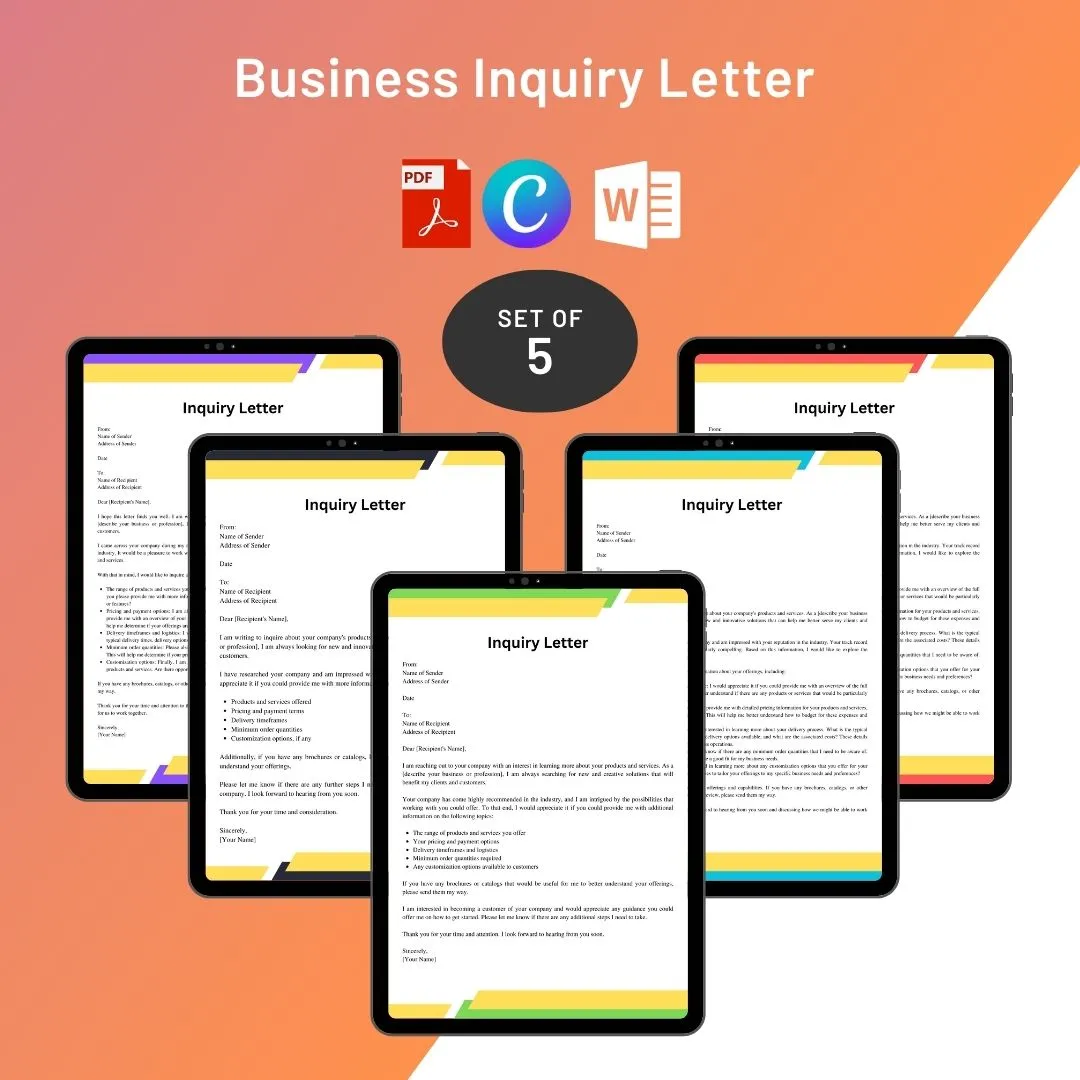
There are several strategic times to deploy a cover letter inquiry. One of the best scenarios is when you have identified a company you are passionate about, even if they aren’t actively hiring. This shows initiative and a genuine interest that can impress. Consider using it when you’ve networked with someone at a company and want to follow up on a potential lead, or when you are transitioning careers and want to explore possibilities within a new industry. Another good time is after attending a career fair or industry event, where you met recruiters or company representatives. Additionally, if you know a company is growing or expanding, sending an inquiry can be a smart move. The key is to research the company and tailor your inquiry to their specific needs and culture. Timing, relevance, and personalization are key to a successful cover letter inquiry.
Crafting a Compelling Cover Letter Inquiry
Subject Line Strategies
The subject line is the first impression, so make it count. A well-crafted subject line grabs attention and encourages the recipient to open the email. Avoid generic subject lines. Instead, be specific and professional. Options include “Inquiry Regarding Potential Opportunities at [Company Name],” “[Your Name] - Expressing Interest in [Industry/Role] at [Company Name],” or “Following Up: [Your Name] - [Brief Description of Your Skills].” If you’ve been referred by someone, mention their name in the subject line to increase open rates. Keep it concise, and avoid using any gimmicky or overly casual language. Ensure the subject line is relevant to the email’s content and clearly states the purpose of the message. Experiment with different subject lines to see which ones get the best response rate, but always maintain a professional tone.
Opening Paragraph: Making a Strong First Impression
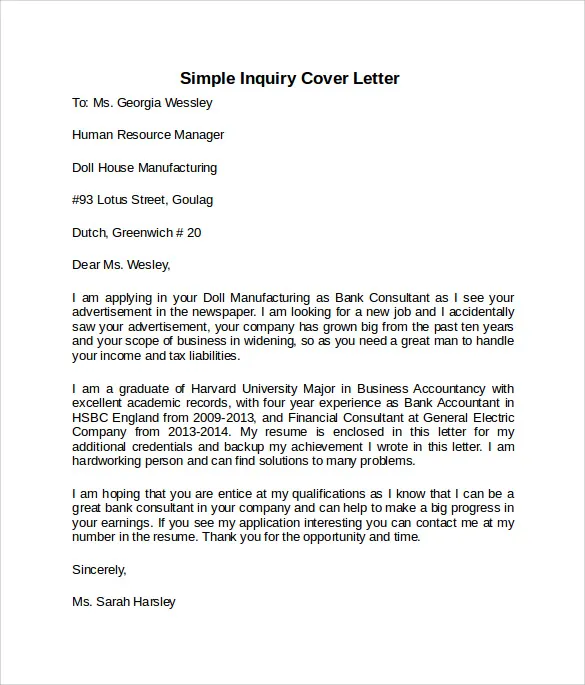
Your opening paragraph sets the tone and captures the reader’s interest. Start with a strong hook that immediately grabs attention. Briefly state your purpose for writing the inquiry, mentioning the company or the specific role you’re interested in. If you have a connection, mention the referral (e.g., “I was referred to you by [Name]…”). Express your genuine interest in the company and its mission. Highlight a specific achievement or aspect of the company that resonates with you. Keep it concise, professional, and enthusiastic. The goal is to make a positive first impression and encourage the reader to continue reading. Avoid generic openings and instead, tailor your message to the company and the individual you’re contacting. This demonstrates that you’ve done your research and are genuinely interested in the opportunity.
Body Paragraphs Highlighting Skills
The body paragraphs should concisely highlight your relevant skills, experience, and accomplishments. Focus on what you can bring to the company. Tailor your content to match the company’s needs and values. Use specific examples to illustrate your skills and the impact you’ve made in previous roles. Quantify your achievements whenever possible. For instance, “Increased sales by 15%” or “Managed a team of 10.” Show how your skills align with the company’s goals. Keep the language clear and professional. Avoid jargon or overly technical terms that the reader might not understand. Break up large blocks of text with bullet points or short paragraphs. Focus on a few key skills and provide concrete examples of how you’ve applied them to achieve results. The goal is to demonstrate value and make a strong case for why you would be a valuable asset to their team. The body must maintain a positive and enthusiastic tone.
Closing Paragraph: Call to Action
The closing paragraph is crucial for encouraging a response. Restate your interest in the company and express your availability for a conversation or interview. Provide a clear call to action. For example, “I would welcome the opportunity to discuss how my skills and experience can contribute to [Company Name]’s success.” Include a thank you for the reader’s time and consideration. Provide your contact information, including your phone number and email address. Make it easy for the recipient to respond. Proofread the entire message before sending it to avoid any typos or grammatical errors. End with a professional closing, such as “Sincerely,” or “Best regards,” followed by your full name. Make sure to show enthusiasm and demonstrate that you are eager to learn more about potential opportunities and how you can contribute to the company.
Formatting and Tone
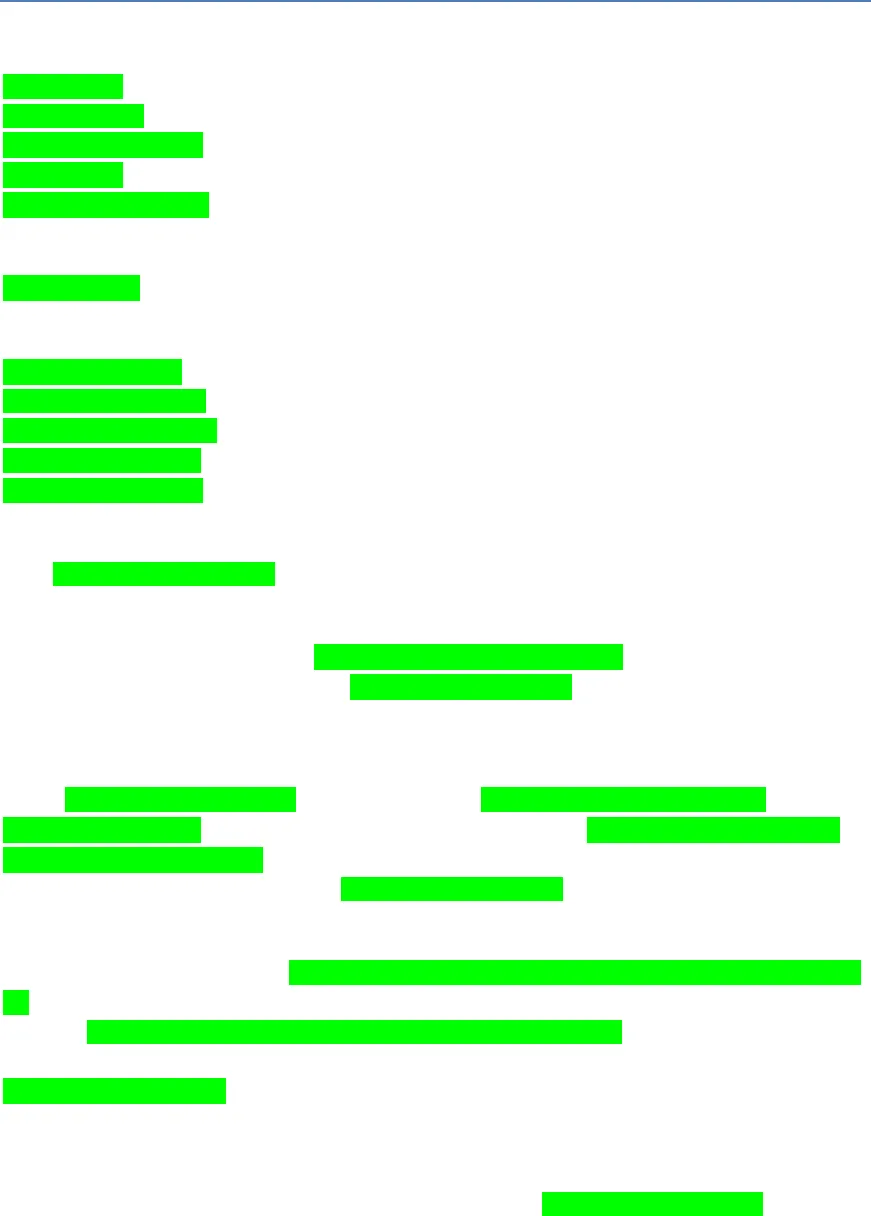
The format and tone of your cover letter inquiry reflect professionalism and attention to detail. Use a clear and concise writing style, avoiding jargon or overly complex language. Keep the email concise, ideally within one page. Use a professional email address and format your message with a standard font, such as Arial or Times New Roman, with a readable font size. Ensure proper grammar, punctuation, and spelling. Maintain a positive, enthusiastic, and confident tone throughout the message. Personalize the message to the recipient and the company. Tailor the content to the company’s specific needs and culture. Show respect for the reader’s time. Proofread carefully before sending to eliminate any errors. The goal is to create a polished, professional, and engaging message that captures attention and encourages a positive response. Make sure the tone and formatting align with the company’s culture to make a good impression.
Examples of Effective Cover Letter Inquiries
Example 1: Networking Approach
This approach leverages your existing network to create an opening. It is a great way to get your foot in the door. Include the following in your cover letter: “Dear [Name], I hope this email finds you well. I am writing to you because I was referred to you by [referrer’s name], who spoke highly of your work at [Company Name]. I am very impressed with [specific company achievement or project]. I am [your profession], with [number] years of experience in [your field]. I am writing to inquire about potential opportunities at [Company Name]. I am eager to learn more about any positions that might align with my skills in [list key skills]. Would you be available for a brief conversation to discuss how I might contribute to your team? Thank you for your time and consideration. Sincerely, [Your Name]”.
Example 2: Company Research Approach
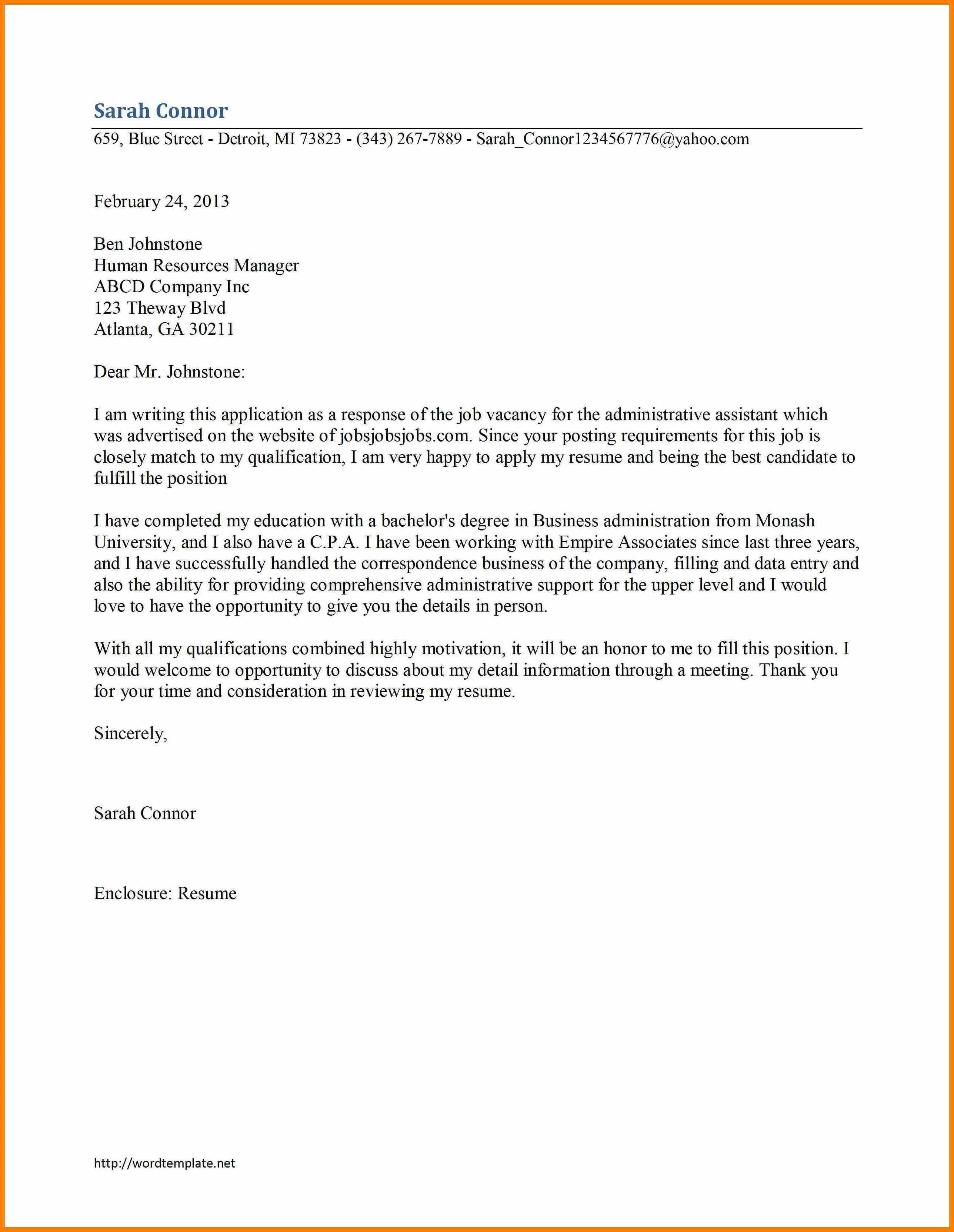
This approach uses in-depth research to show a clear interest in the company. Include the following in your cover letter: “Dear [Name], I am writing to express my strong interest in potential opportunities at [Company Name]. I have been following your work in [industry/area] for some time, and I am particularly impressed with [specific achievement or project]. As a [your profession] with a passion for [relevant skill or area], I am confident that I can make a significant contribution to your team. I am particularly interested in [specific aspect of the company’s work]. I have a proven track record in [list key achievements]. I would welcome the opportunity to discuss how my skills align with your goals. Thank you for your time and consideration. Sincerely, [Your Name]”.
Example 3: Following Up on a Contact
This approach is for when you’ve already made contact with someone at a company. Include the following in your cover letter: “Dear [Name], Following up on our conversation at [event/meeting], I wanted to reiterate my strong interest in potential opportunities at [Company Name]. I was very impressed with [specific aspect of the company or conversation]. As we discussed, my skills in [list key skills] align well with the company’s needs. I am eager to explore how I can contribute to your team. I have attached my resume for your review and would be grateful for the opportunity to discuss potential openings. Thank you again for your time and guidance. Sincerely, [Your Name]”.
Common Mistakes to Avoid
Generic Inquiries
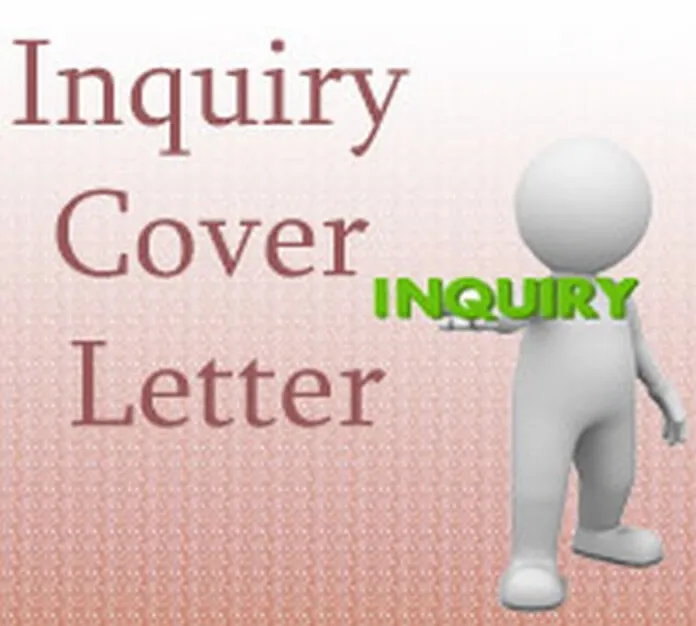
Avoid sending generic, mass-produced cover letter inquiries. These lack personalization and show a lack of genuine interest in the company. Always tailor your message to the specific company and the individual you’re contacting. Research the company’s values, culture, and recent achievements. Highlight specific aspects that resonate with you. Use the recipient’s name (double-check the spelling!), and reference any previous interactions or connections. Generic inquiries signal a lack of effort and decrease your chances of receiving a positive response. Customization is essential to make a good impression.
Lack of Personalization
Lack of personalization makes your message seem impersonal and shows that you haven’t taken the time to research the company or the contact. Avoid using generic greetings. Research the recipient’s name and job title. Customize your content to reflect the company’s specific needs and culture. Mentioning a specific project, achievement, or value that resonates with you demonstrates that you’ve done your homework. Use your unique skills and experiences to differentiate yourself. Tailoring your inquiry to the recipient’s interests and responsibilities makes the message more engaging and increases your chances of a positive response. Every message should be unique and tailored to the recipient and the company you are contacting.
Typos and Grammatical Errors
Typos and grammatical errors undermine your credibility and make you appear unprofessional. Proofread your cover letter inquiry carefully. Use a grammar checker. Ensure your message is clear, concise, and well-written. The recipient will judge you on the quality of your writing. Double-check the recipient’s name, company name, and other essential details for accuracy. Errors suggest a lack of attention to detail and professionalism. Taking the time to proofread demonstrates respect for the reader and increases your chances of getting a positive response. The details show that you have taken the time to do your best work.
Maximizing Your Cover Letter Inquiry Success
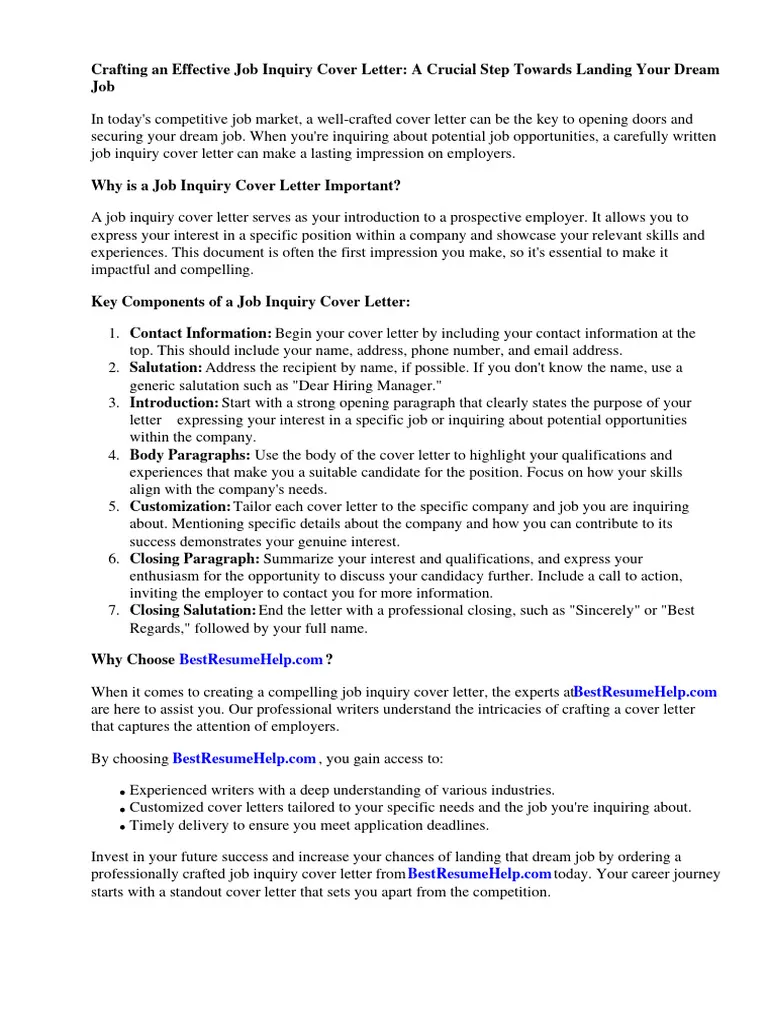
Researching the Target Company
Thorough research is the foundation of a successful cover letter inquiry. Visit the company’s website. Read news articles and press releases. Analyze their social media presence. Identify their mission, values, and recent accomplishments. Understand their current projects and challenges. Use LinkedIn to research key individuals and identify potential contacts. Tailor your inquiry to the company’s specific needs and values. Demonstrate that you understand their industry and business objectives. This preparation enables you to customize your message, show a genuine interest, and increase your chances of making a strong impression. A well-researched inquiry shows that you are serious and committed.
Tailoring Your Inquiry to the Specific Role
Even in the absence of a specific job posting, tailor your inquiry to the type of role you seek. Highlight relevant skills and experience that align with the company’s potential needs. If you have a clear idea of the role you want, mention it. If you are open to different positions, be flexible, but always emphasize skills that would benefit the company. Use keywords from similar job descriptions to show your expertise. Focus on the value you can bring to the company. Show how you can solve problems and contribute to their success. Demonstrate how your background aligns with their goals. This targeted approach increases your chances of getting noticed and considered for a position that matches your skills and career objectives.
Following Up Professionally
Follow up is essential after sending your cover letter inquiry. Send a polite follow-up email within one to two weeks if you have not heard back. Reference your initial inquiry and restate your interest. Keep the message brief and professional. Avoid being overly persistent. If you do not receive a response after a second follow-up, you can assume the company is not interested. Use this as an opportunity to refine your approach and focus on other opportunities. If you do receive a response, be prepared to answer questions, provide additional information, and arrange an interview. Professional follow-up demonstrates persistence and commitment. Always maintain a positive and professional attitude.
Conclusion
Cover letter inquiries are a valuable tool in the job search process. By understanding how to craft a compelling message, tailoring your inquiry to the company’s needs, and following up professionally, you can increase your chances of landing interviews and ultimately, securing your dream job. Remember to research the company thoroughly, personalize your message, and proofread carefully. Use the examples provided as a guide and always maintain a positive and enthusiastic tone. With these strategies, you’ll be well-equipped to make a strong impression and stand out from the competition. Good luck, and happy job hunting!
